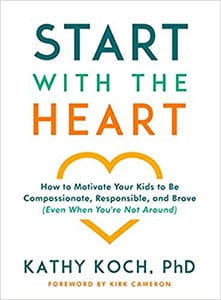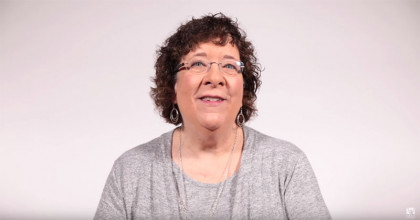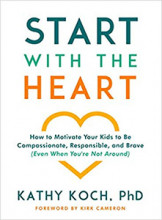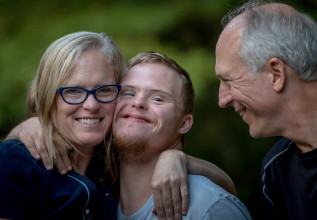Kathy Koch: I think that what parents need to understand is that kids are either motivated for apathy or energy. Motivated for obedience or disobedience.
Jim Daly: Wow.
Kathy: Motivated to be kind or unkind. Motivated to be seen or to be invisible. We are all motivated.
John Fuller: Dr. Kathy Koch joins us today for this Best of 2019 episode of Focus on the Family. Your host is Focus president and author Jim Daly, and I’m John Fuller.
Jim: This program hit our Best of 2019 list because Dr. Kathy is so good at helping us parents better understand and relate to our kids.
We all want our children to be successful adults, and that’s the goal. And here at Focus on the Family our mission is to equip you as a mom and dad with the tools and godly wisdom you need to raise your children from infants to adults serving the Lord, loving the Lord, and loving those around them.
Today, Dr. Kathy will help you understand the importance of your relationship with your child. And how you can teach and model godly character and then motivate the necessary changes in your child’s behavior and attitude.
She works so closely with parents and children, and she has a great perspective and the insights to share with us today.
John: Dr. Kathy Koch is the founder and president of Celebrate Kids, Incorporated. Is the co-founder of Ignite the Family, and has written a number of books, including the one we’re covering today, Start with the Heart: How to Motivate Your Kids to Be Compassionate, Responsible and Brave, Even When You’re Not Around.
And we’ll pick up, Jim, as you welcomed Dr. Kathy Koch to the table.
Jim: Kathy, I have so many – what I think – are great questions for you, I mean, really. And we’re going to try over the next couple of days to cover so much ground. But let’s start with the biggest one of all. Why is it imperative for us as parents to capture and keep our children’s hearts?
Kathy: Well, first, let me say thanks for allowing me to be back on the show because I love what you do here at Focus. And radio is an efficient way to be influential. And I do hope that moms, and dads, and grandparents, and educators, and aunts and uncles have stopped and are going to listen to what we’re all about today.
You know, the relationship matters, right? If kids don’t know that we care, they don’t care what we know.
Jim: That’s for sure.
Kathy: And you’ve heard that before. It’s not a T-shirt slogan. It’s a – it’s a very true statement. And so, the challenge I think for us in our busyness, in our – in our counterculture and we’re overwhelmed is, how do we let our kids know that we really do care about their hearts and that they matter to us more than their behavior. More than their obedience, they matter to us.
Jim: You know, Kathy, I’m thinking of the mom or dad, though, that we hear that, we’re adults, we can rationalize that, we love our children, and we want to love them beyond bad behavior. But I think the neon sign the child hears is, “It’s all about my behavior.” How do you realize that, as a parent, and still love your kid through bad stuff?
Kathy: Right. You know, it’s being ever-present. It’s a smile on your face. It’s, you know, a pat on the back. It’s grace and mercy. It’s, you know, we all have bad days. We all have bad days, right? Could we own that? Could we understand that parents have bad days?
We spill our milk, if you will. We, you know, get stopped at the red light and are running late and are frustrated, and we speak out of turn somewhere. So, we don’t always, 100 percent of the time, act consistently. So, let’s give grace and space to our kids to be who they are. Always wanting something more. And we can talk on broadcast here about how to communicate hope in the midst of that heartache…
Jim: And we’re going to.
Kathy: …Because I think that’s a part of the issue. Who do we know they are? Who do we want them to be? Do we understand imperfection is a part of life, right? And it doesn’t reflect badly on us. Like, a lot of parents I think are – when a child misbehaves, it’s like, “Oh, I’m a bad parent.”
Jim: Well, that’s the core problem, isn’t it?
Kathy: And then we parent out of that negativity and out of that fear and out of that guilt – right? When we could have been the best of the best, setting our kids up with beautiful boundaries and with healthy expectations and lots of practical strategies to encourage them. And yet, they’re not going to always behave the way we want.
Jim: Well, let’s – we’re going to take this step by step. Um, in your great book, Start with the Heart, you mention a child wants to be known. That’s kind of the core thing. How can we really know our children? And then what are some practical ways to zero in on that, especially if we have more than one child, I mean, a household of three or four kids, to know each child really well and intimately and then to parent accordingly rather than kind of efficiently?
Kathy: Oh, that’s a great way you worded that. Right. It’s spending time with them one-on-one and, you know, asking questions on a regular basis on the bad days and the good days about, you know – what turns you on and what ticks you off. And what are your interests, and what are your passions. And if you could go to the library and choose any book, what would you choose and why. And if you went to the mall or the shops in the area, what store would you go to and why? And asking a variety of questions about a variety of things – interests and talents, and strengths and weaknesses – and even taking notes and having the kid say, “Why did you write that down, Mom?” “Well, because I want to remember that you’re interested right now in that, so if I run across an idea related to that as I’m out and about, I want to capture that idea for you so we can talk about it more.
You know, I love knowing that about you.” You know, as kids are older, it’s essential when we look at high school electives and post-high school decision-making, do we know who they are? So, I think it’s, um, good questions. And it’s also letting them ask us questions.
Jim: Hm.
Kathy: So, it’s not an interrogation, but it’s the family dynamic. Do we know each other? And “Dad, when you were my age, what did you like doing in your spare time?” And are we available to their questions so that they also get to know us?
Jim: That’s good discussion. You also mentioned the critical nature of resiliency. I so appreciate that because I think for me and my childhood, that resonates. I had to be resilient, being an orphan kid and stuff I went through. And, you know, it probably is what gives me hope, even though my teen boys sometimes irritate me and do some things. I have a little more laid-back attitude about it. It’s probably because of my experience, you know, that resiliency counts. And part of the way you become resilient is you overcome obstacles, right?
Kathy: Exactly, Jim. So, resiliency, choosing to bounce back quickly from despair, trauma, disappointment, it’s a choice. It’s a part of character. And it’s learned. And it’s learned when you’re allowed to struggle…
Jim: Or have to.
Kathy: …Or have to. That’s true. So – right. So, parents who quickly rescue – and I get this, right? It’s not easy for a parent or an educator to watch a child struggle. You know, you don’t want your kids to be unhappy. I respect that. And yet, we know what we know. And that is that when kids overcome difficulties on their own and with the assistance of someone, they feel better about themselves. So, you discover character. You discover your strengths and your talents and the healthy part of who you are. And you know what? Because – and here’s the thing, you guys. I want children to overcome trauma in the safety of your home. And if we continue to rescue and never let them struggle, the day they struggle when they’re out and about, they’re going to crash and burn.
Jim: It’ll be catastrophic.
Kathy: It could be. It could be. And we probably all know those stories. So, I want to encourage the parents to, if you will, keep their mouths shut sometimes and sit on their hands and just let the kids suffer the consequences of the choices. And that’s powerful language, by the way. It was your choice to forget you had a test. No, no, no I didn’t mean – no, it was your choice. That’s a very powerful word. And that’s a theme in the book, is that to help kids own and be responsible for both the strengths and the challenges that exist in the world or in their situation. So, um, it was your choice to forget. It was your choice to rush. It was your choice – you know, those kinds of things are really, really important. And that allows us to have a deeper conversation, I think.
John: So, as we talk about character and motivation, I mean, you’re on it right there, motivating your child by saying, “You’re the person that has the choice. You’re the person that’s responsible for the decisions and the outcomes of your life,” instead of me stepping up. That’s hard to do, though. There’s a price for me as a parent when they mess up.
Kathy: Exactly. So, your ego is at risk, right?
John: Well, my time and the judgment I’m going to get, the anger I’m going to get from them because it’s somehow still is my fault, even though it’s theirs.
Kathy: Oh, man. And this is where you look them in the eye and say, “Man, I’m listening, but you’re wrong.” Let’s call wrong wrong, right? Let’s be brave. Here’s the thing, guys, I say in the book, “Parent so that they’ll want to be your friend when they’re 25 years old.” Don’t parent so that they’ll be your friend today. Parent so that they want to hang out with you later and you have a multigenerational, long-lasting family. What a powerful, beautiful thing that is. And that comes about when we’re honest. They’re not going to ask us to be honest in those ways, John. But I know and you know that there’s a blessing there. And you got to parent long and strong and believe that it’s going to come back for you.
Jim: And that’s really the theme of the whole book, is how to do that well, how to launch them well, how to be a friend at 25 still as a parent. But the nitty-gritty is the nitty-gritty. One of the things I know in my own experience, a lot of our parenting discussion with Jean, it’s about, how do we continue to build character into the boys? Especially, I think for Christian homes, this becomes job one. We want our kids to have character – good character. We want them to make good decisions, et cetera. So how can we help our children become better in that character area?
Kathy: Yeah. Thanks for asking. No one might like what I’m going to say, but it does start – this does start with us, again, right? Kids tell me all the time, hypocrisy doesn’t work. So, are we kind and gentle and generous and outgoing? Humility. Let’s start with humility. I make the claim that I think humility is the first and most important quality to have because it can motivate all the others. And so, the opposite of pride, right? So not – not, “I’m worm on the ground,” but “I’m important. I have worth because God chose to make me, and He made me, me, and I’m created in His image, and it’s amazing. But I’m no more important than anyone else.” When I’m humble, I’m teachable. When I’m humble, I don’t have to win every argument. In fact, I won’t even argue because I don’t need to. I always have my authority, um, at the forefront, if you will. So, humility is very important. If you’re a prideful mom or dad and you’re always right and you never make a mistake and you’re never responsible, I’m sorry; they’re not going to feel safe with you being humble, the very thing that you claim that you want them to be. So that starts with us.
Jim: I like that, the humility factor. What are some of the other character traits we should point our kids toward?
Kathy: Self-respect because self-respect motivates us to want all those other qualities again. And self-respect is an essential preventative to bullying and things like that. Respect for others and self-control – I put them in that order. If I’m humble and if I have self-respect, I will want to have other healthy Christ like character. If I have self-control, I’ll be able to have those qualities, like patience and generosity and kindness and goodness. And then if I respect others, I will want to exhibit those qualities. So, in our home, if they’re not exhibiting healthy character, it might be because they don’t respect us. Maybe we’re not listening to them. Maybe we’re not present with them in the midst of challenge. Maybe we don’t celebrate their successes and so they don’t think that we know them, so they don’t care.
If you have kids who you find out are very different outside of the home from in the home, that’s a challenge, right? Sometimes unconditional love in the home allows them to challenge you because you’re always supposed to love them.
Jim: Yeah.
Kathy: That’s role of dad, right? And I praise God for dads who are willing to step into that reality. But I would also say that it could be a respect issue.
John: How much of that, though, Kathy, comes from a child’s lack of self-respect? In other words, “I don’t respect myself, and so I can’t really give you any respect.”
Kathy: Right, which is why that’s the second quality that I make the argument for because you’re exactly right. So – and then, John, how do kids learn to respect themselves? By being respected, right? It’s – there’s very much a double-sided arrow there. So, again, do we know them – strengths, weaknesses, challenges, delights, hopes, focuses, purpose, fears, grief, loss? Do we know in the knowing of our knowing what’s really going on there? And, John, as you were saying before, this takes real investment. That we have to slow down. You know, some of us would rather go and run an errand by ourselves and have a little bit of quiet time. I respect that. But take your sons with you. Boys always talk more when they’re busy doing something than when they’re sitting at the kitchen table being interrogated.
(LAUGHTER)
Kathy: So, you need to go to the store and buy, you know, a piece of plumbing to repair something, take your boy with you. And you’ll have a stunning conversation about something. And you can turn it towards self-respect in a surprising kind of a way and kind of surprise him with, “Man, I’m so impressed that you’re curious about this. That means that you’re capable of learning, and that’s a respect issue – really proud of you.”
Jim: You know, it’s interesting in that regard, and, John, you have the daughters here so you can speak to this, but what I find – and it’s so hard – is my boys usually want to talk at night. And I’m a morning person.
(LAUGHTER)
Kathy: Oh, dear.
Jim: And, boy, I mean, I’m talking about they’re back from seeing friends 10, 11 o’clock at night and I’m going, “Really?”
(Chuckling)
Jim: I mean, it’s hard. I can barely keep my eyes open. But that’s the moment, right? You’ve got to find the ability as a parent to engage. Thankfully, Jean is much more of a night person, so when I doze off, she can carry on the conversation.
Kathy: Well, that’s an encouragement to me that you put them first, and you sacrifice for yourself. You know, you sacrifice for them…
Jim: Well, we try.
Kathy: You try. You know, we’re not perfect at it, for sure. But, yeah, kids love talking in the dark. They tell me all the time that whether that be – mostly, that is at bedtime. And they like the dark, Jim, because they don’t have to look into your eyes if they’re going to tell you something that might hurt your heart.
Jim: Well, I think of that.
Kathy: Yeah, and then kids also tell me they like the car for the same reason, which is another reason to run errands with them because – or even to go for a drive in the country on a Saturday…
Jim: You don’t have to look eyeball to eyeball.
Kathy: Exactly, exactly.
Jim: That really works for boys. Kathy, this integration of the fruit of the spirit is love, joy, peace, goodness, kindness. These are great attributes.
Kathy: Absolutely.
Jim: This is coming right from the heart of God. If you’re of God, you will express these attributes – if you’re in Me, basically. And how do we help our children to understand that? It’s not just because it’s virtuous to be humble. It’s because God is humble.
Kathy: Yes.
Jim: And we’re made in His image.
Kathy: I love that. We have to teach them who God is.
Jim: Right.
Kathy: Some of us need to stop teaching what I would call – oh, I don’t know if I can say this.
Jim: Say it.
Kathy: You know, irrelevant truth. So, here’s the thing. The whole Bible’s relevant. The whole Bible is for us. The whole Bible’s true. It’s the inerrant word of God, Genesis to Revelation. I am not saying that it’s irrelevant. However, when I look at the counterculture, messy people, questions kids are having today about life, we have got to be teaching them things from the Scripture that matter to them in their circumstances – the names of Christ. The names of God. The attributes of God. The faithfulness, full of faith. And, “Let me tell you a time in my life when He was faithful to me. And, Jeremiah, last week, God was faithful to you. Do you know what I’m talking about, Jeremiah? Do you remember a time last week when God was on your side?” And let Jeremiah go, “Oh, Dad, I remember now. Was that God?” We have got to make the kids know that God was there in their moments, right?
Jim: Help them make it personal.
Kathy: Absolutely. And – and that God, Jesus, the Spirit, He is for them, He is with them, He is on them. And it’s attributes, it’s names, it’s – there’re stories, certainly, that we can share. I’m a huge advocate of the names of Christ, the names of God, um, I think because that’s who He is. And we are made in His image. And we are called to become more like Christ. So, the other thing I would say, Jim – I love your question – it’s discipleship. Just because a child comes to faith in Christ and might even choose that obedient act of baptism, if they’re not matured in their faith and discipled in the things of faith, there is no guarantee that the fruit of the spirit shows up in the daily walk because we still have a sin nature, right?
Jim: Absolutely.
Kathy: And so, are we teaching? Are dads and moms carving out precious time to teach the truth? Is the word of God open on a regular basis? Do they see us turn there when we have questions that we want answers to? Or is it just a Sunday morning, Wednesday night ritual?
Jim: Yeah, those are excellent points.
John: Great encouragement from Dr. Kathy Koch today on Focus on the Family. And you can get this conversation on CD or as a download from our website, along with Kathy’s great book, Start with the Heart: How to Motivate Your Kids to Be Compassionate, Responsible and Brave, Even When You’re Not Around.
Jim: Sounds good to me.
John: Look for these resources and more at focusonthefamily.com/broadcast.
Jim: Kathy, I want to speak to that difficult situation, the child that he or she doesn’t seem motivated or care or concerned about these attributes. You know, a well-intentioned parent is trying to do their best. And hopefully, they’re expressing these attributes of God – humility and kindness and mercy – and it’s there. But their children – maybe due to peer pressure, maybe it’s junior high – oh, my goodness, junior high – who knows the influences that are upon them? What can you do in that case when you’re laying down side by side in bed at night and the discussion is all about Bob? Little Bobby, or little Mary. Something’s not right. She’s not connecting. He’s not connecting with this. What is going wrong? So, in that context, what kind of evaluation can a parent go through to say, “Okay, where are we missing it, or where is our child needing help?”
Kathy: The first thing I want to say is that every child is motivated. I think that what parents need to understand is that kids are either motivated for apathy or energy. Motivated for obedience or disobedience.
Jim: Wow.
Kathy. Motivated to be kind or unkind. Motivated to be seen or to be invisible. We are all motivated. The wrong question is, “How do I motivate my child?” The right question is, “How do I redirect their motivation to the things that I want them to value, the things that matter?”
Jim: Yes.
Kathy: That changes the conversation.
Jim: Okay, so in this case, some parents use the wrong tool. They think if they concentrate on behavior, they’ll get good behavior. But the reality is sometimes that doesn’t work that way. And you have to back up and do it differently with that child who will not respond to your nagging when it comes to behavior. So, what’s a different tact a parent can use that is often successful – maybe not always – but just in that context where you have misbehavior and you’re drumming the drum, bang, bang, bang?
Kathy: Right, assuming that, you know, another reward would work or another punishment, if you will, will work…
Jim: All about constant – you know, the whole thing about risk and reward.
Kathy: Right, right. So, I would love the parents to step back and observe longer and ask themselves, “What is motivating my child to move in that direction? Is it peer acceptance? Is it peer pressure? Is it – I know of some kids who self-sabotage and they don’t want the pressure of excellence because it’s easier to be average. I can be average.
Jim: Interesting.
Kathy: My goal is average. I can be that. So now I’m successful. So now I feel good. If you perceive that that’s what’s going on and they’ve lowered their expectations of themselves, then you look for the opportunity for the teachable moment to have a conversation, and you prove to them that they’re capable of more. I use the phrase, “I know because” – like, what’s the evidence? “I know you’re capable of a B-plus. I know because for – I’ve tracked your records, and for a month, this has been the score. So, you’re not that far away from a B-plus. I know you’re capable with a little bit more effort or a little bit more diligence…”
Jim: Discipline.
Kathy: …Or concentration or focus or ask for help or something like that. Back to your question – I don’t want to hijack the conversation. You asked a really important question, Jim, about trying to, you know, enter into it getting to know what’s going on there. Listen longer. We just need to be quiet.
Jim: That’s so hard. Why is that so hard for us?
Kathy: Oh, it’s so hard because we want to problem solve.
(LAUGHTER)
Jim: We do.
Kathy: And what – you know, what I believe and so many of us believe is that if a child feels like a problem you’re trying to solve or a project you’re trying to finish, they don’t feel safe with you. They’re not projects to finish and problems to solve. Children are not problems. Children have problems.
Jim: Oh, interesting. Wow.
Kathy: But they’re not problems. And it’s very easy for kids of all ages to feel like they’re the problem. I get that. No parent listening to us wants that to happen. Parents have the greatest goal of rescuing their kids from pain and heartache. I respect that. We need to listen longer. What’s really going on there?
Jim: I would only say though, Kathy – and I’ve done it – many of us do project, I think, unfortunately, “You are the problem. If you would just change your behavior, you would have a better outcome. So, you got to change. You are the problem.” We don’t say it that directly. But it’s kind of oozing out of us in different ways. And the kids get it. They feel it, don’t they?
Kathy: Oh, yes. They tell me they do.
Jim: Yeah. You see thousands of kids.
Kathy: Right, and some of the kids will even say, “Dr. Kathy, I know I am the problem.” You know, and then I’m like, “Whoa, whoa, whoa, no, no. Let’s back up. No, you’re having problems. You’re struggling. You’re concerned about X, Y, Z. So, do you want to overcome those?” You know, and then you begin to look at the focus of change. So, and change, again, there’s a chapter in the book about change, um, and we can talk about that if you want. That’s an important thing that kids understand that you can’t just snap your fingers and have it all go away, like technology makes everything easy.
Jim: The question I wanted to illustrate – and you did a great job in the book – is a baby chick…
Kathy: Oh, yeah.
Jim: …breaking out of the egg. Because I think this is the exact spot where you got to let your children struggle a bit. It’s actually good for them. But in this, you know, kind of Type A, buttoned-up culture we have right now, we don’t want them to suffer. We don’t want them to expend negative energy overcoming an obstacle. But describe that analogy of the baby chick.
Kathy: Yeah. It’s kind of fun, isn’t it? When you – if you have an incubator and you see the egg begin to roll or, like, the chick has decided it’s time has come, well, if the chick, um, pecks once and it hurts and quits, it’ll die.
Jim: Huh.
Kathy: So, no pain, no gain. You know, no pain equals death. You know, if I’m not willing to walk through something that’s challenging, I won’t grow. I might actually die. Hello, suicide. Now, that’s a whole ‘nother – I don’t mean to be light about that, but that’s very relevant because you have to be willing to work hard, to overcome, to go through some maybe pain to get to the other side. The other analogy with the chick that’s so true is that the parent, the well-meaning adult, sees that egg roll, “Oh, I’m going to save that chick from all that effort.” And I pick up the egg and I – and I crack it open. And guess what, Jim? That little chick dies because it’s the effort that develops the lungs that allows it to breathe on its own.
Jim: Wow.
Kathy: So, if I rescue too soon, the chick dies. So, no pain, no gain, too much help…
Jim: Same outcome.
Kathy: …Same outcome, same outcome. And how we balance that in the home is what I think is the challenge.
Jim: You know, Kathy, at the end here, I think – and we’re gonna come back next time to continue this discussion – but at the end, let’s end on that note of help and something that parents can do tonight. So, when you boil this all down and the parents that are struggling – maybe the single parent, put it in that context as well – who is struggling with a child’s attitude or behavior, what’s the best thing they can do right now? They’re at the end of their rope. They don’t know what to do. Just put a child in your mind – a 12-year-old, a 13-year-old. What can they do tonight to help make a move toward a better direction?
Kathy: Think about what’s been going well lately and talk about that. Talk about strengths with your child because you have to know your strengths to overcome your weaknesses.
Jim: So, don’t concentrate on negatives at all?
Kathy: There are times for that.
Jim: Yeah, but the relationship has to be stronger for that to occur, so work on strengthening the relationship by concentrating on the positive things?
Kathy: Right, because the kid will want to be with you if he believes you might talk well of him. And he will run from you if he assumes that every time you empty the backpack, it’s gonna be like, “Oh, my goodness, what did you do wrong again?”
Jim: Kathy, man, this has been so informative and insightful. And you do it every time. You’re killing me!
(LAUGHTER)
But it is so good. And we’re both in that mode, John. I mean, with Dena and Jean, we’re parenting ourselves, so this is helping us, too. And I hope it is helping, you, the listener. That’s the goal. This is what we want to do, is to strengthen your ability to raise healthy, probably not perfect, I can almost guarantee that, children – but healthy, young people that are serving the Lord and taking care of those around them. That’s the outcome. And let’s come back next time, talk about the five core needs that are mentioned in your book and so much more. Can we do that?
Kathy: I would love to do that.
Jim: Okay.
John: Dr. Kathy Koch’s messages are always so very strong and elicit such great response from you, our audience. And, accordingly, this was one of our Best of 2019 broadcasts here on Focus on the Family. And I trust the conversation has inspired you to be more intentional in your parenting.
Jim: But Dr. Kathy always delivers insight and wisdom with such heart and gives us the tools we need to be better parents. And really, it all comes down to relationship. The stronger the relationship you have with your child the better off both of you will be. And that’s God’s wiring when it comes to the family.
And this is just part of what we’re all about here at Focus on the Family. We are here for you with the trusted parenting advice you need in raising your children.
But we couldn’t do this without you. Your prayers and financial support help us provide this kind of ministry and outreach to parents in order to strengthen families. Not just here in the U.S., but across the globe.
Here at the end of the year we really need to hear from you. This season seems to bring out the hurt and the need for so many. But you can help when you share the gift of family today.
John: And for your contribution of any amount, either as a monthly sustainer or a one-time contribution we’ll send you a copy of Kathy’s book, Start with the Heart. Those funds go right into ministry and caring for families like yours.
Jim: And now, thanks to some special friends here at Focus on the Family who have generously provided a “Gift of Family” match, your holiday gift will be doubled. And you don’t want to miss out on this. It’s a great opportunity to help twice as many people today.
John: Donate and find out more about Kathy’s book and our Best of 2019 set, either a CD or a digital download, details at focusonthefamily.com/broadcast. Or call. Our number is 800.232.6459. 800, the letter A, and the word FAMILY.
On behalf of Jim Daly and the entire team, thanks for joining us today for Focus on the Family. I’m John Fuller inviting you back as we hear more from Dr. Kathy Koch next time, and once more help you and your family thrive in Christ.






















